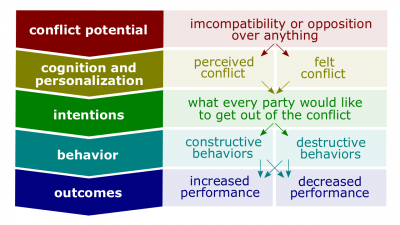Difference between revisions of "Conflict process"
(Created page with "400px|thumb|right|[[Conflict process]]Conflict process (hereinafter, the ''Process'') is a process that has five stages: (1) conflict p...") |
|||
| Line 1: | Line 1: | ||
[[File:Conflict-process.png|400px|thumb|right|[[Conflict process]]]][[Conflict process]] (hereinafter, the ''Process'') is a [[process]] that has five stages: (1) [[conflict potential]], potential opposition or incompatibility, (2) [[conflict personalization|cognition and personalization]], (3) [[conflict intention|intention]]s, (4) behavior, and (5) [[conflict outcome|outcome]]s. | [[File:Conflict-process.png|400px|thumb|right|[[Conflict process]]]][[Conflict process]] (hereinafter, the ''Process'') is a [[process]] that has five stages: (1) [[conflict potential]], potential opposition or incompatibility, (2) [[conflict personalization|cognition and personalization]], (3) [[conflict intention|intention]]s, (4) behavior, and (5) [[conflict outcome|outcome]]s. | ||
| + | |||
| + | ==Definitions== | ||
| + | According to [[Organizational Behavior by Robbins and Judge (17th edition)]], | ||
| + | :[[Conflict process]]. A process that has five stages: potential opposition or incompatibility, cognition and personalization, intentions, behavior, and outcomes. | ||
==Related coursework== | ==Related coursework== | ||
Revision as of 05:15, 26 November 2018
Conflict process (hereinafter, the Process) is a process that has five stages: (1) conflict potential, potential opposition or incompatibility, (2) cognition and personalization, (3) intentions, (4) behavior, and (5) outcomes.
Definitions
According to Organizational Behavior by Robbins and Judge (17th edition),
- Conflict process. A process that has five stages: potential opposition or incompatibility, cognition and personalization, intentions, behavior, and outcomes.
